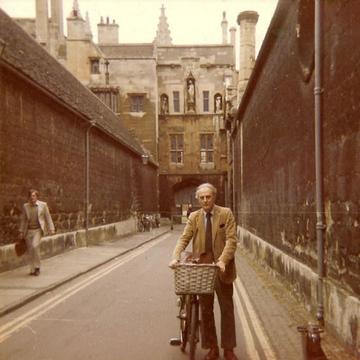Peter Ganz Centenary: Celebrating an Oxford German Medievalist

Help us celebrate the life and work of Professor Peter Felix Ganz on the centenary of his birth, Oxford medievalist extraordinaire, scholar and ambassador of Anglo-German relationship! Join a group of Oxford colleagues, friends, former students and family talking about his scholarly legacy and memories of his life. The event will be life-streamed on Tuesday 3 November, 6:30-8pm, via youtube https://youtu.be/2rhXw0YQOWk. We would welcome tributes and memories; please send them in advance to Adam Ganz <Adam.Ganz@rhul.ac.uk>
Schedule
18.30 Introduction - Adam Ganz
18.35 Peter Ganz as a German Medievalist - Henrike Lähnemann and Nigel Palmer
18.55 Peter Ganz as Mentor - Bryan Ward Perkins
19.05 Peter Ganz and Jacob Burckhardt - Nicolette Mout
19.15 Peter Ganz as Colleague - Andrew Kahn, Nicholas Cronk, and further Oxford colleagues
19.30 Questions and contributions
19.50 close
About Peter Ganz
Peter Felix Ganz (Mainz, 3 November 1920 – Oxford, 17 August 2006) came to the U.K. in 1938 as a refugee, having been held in Buchenwald concentration camp after Kristallnacht, as he and his family were considered Jews under the Nazi laws. He started to read German at King's College London, but was soon interned on the Isle of Man. During the war he served first in the Royal Pioneer Corps and then in the Combined Services Detailed Interrogation Centre (The so-called Secret Listeners), listening to captured German Prisoners of War. He was part of the team at Farm Hall listening to the German nuclear physicists including Werner Heisenberg and Otto Hahn as they heard news of the atom bomb at Hiroshima.
He concluded his studies at King's College London (PhD 1955). After holding lectureships in London, he came to Oxford in 1960 as Reader in German and subsequently Fellow of Hertford College. He was a pioneer of widening participation, part of the small group of Hertford fellows who encouraged applicants from schools who did not usually send pupils to Oxford. In 1972 he was appointed Professor of German and became a Fellow of St Edmund Hall. In 1985 he retired to take up the position of Resident Fellow at the Herzog August Bibliothek in Wolfenbüttel and an honorary professorship at the University of Göttingen (until 1988). His wife Rosemary (with whom he had 4 children) died in 1986. His second marriage to me, a Dutch historian, led him to divide his life between England and the Netherlands.
The subject of his first book (1957) was the influence of English on the German vocabulary, 1640-1815. His interests soon broadened. He edited a number of medieval texts, of which his edition (1978) of Gottfried von Straßburg's masterpiece Tristan became the best-known. His Oxford inaugural lecture on Jacob Grimm's Conception of German Studies (1973) showed his own commitment to the study of language in combination with historical investigations. He wrote on Paul Celan, admired Bertolt Brecht, and loved Theodor Fontane. He did not mince his words, though, if he happened to dislike certain literary figures – a fate that befell Thomas Mann. His teaching reflected his exceptional range of interests.
He was instrumental in bringing together the results of Anglo-American and German medieval scholarship through lectures, conferences, and joint publications. With Werner Schröder (Marburg) he set up the Anglo-German Colloquia for German Medieval Studies still the most important forum for the exchange of scholarship in medieval studies between Britain and Germany. He was awarded the German Großes Bundesverdienstkreuz in 1973. Twenty years later he received an honorary doctorate from the University of Erlangen-Nürnberg.
Peter Ganz at the Herzog August Bibliothek Wolfenbüttel 1986
At the Herzog August Bibliothek he founded an international work group for medieval studies. Among its aims were the modernization of the catalogue of the library's vast medieval manuscript collection and the reconstruction of medieval religious culture in Lower Saxony and beyond. The many visiting fellows found in him a kind, but nevertheless quite challenging interlocutor. The reinvention of the Herzog August Bibliothek as a research centre for European cultural history must partly be attributed to his efforts. The current close collaboration between the Bodleian Library and the HAB through the Polonsky German project would not have been possible if it had not been for this well-established link.
In the seventies he developed an interest in the life and works of the Swiss historian Jacob Burckhardt (1818-1897). He greatly admired Burckhardt for his independent and rigorous scholarship preferring synthesis over narrativism. Ganz devoted his Göttingen inaugural lecture to a rather tongue-in-cheek treatment of Burckhardt's ambiguous relation to academic society. His edition of Burckhardt's lectures, Über das Studium der Geschichte (1982), is a masterpiece, and in 2000 the second edition was included in the new Kritische Gesamtausgabe of Burckhardt's works. His edition of Burckhardt's medieval lectures was still unfinished at the time of his death.
***
Further reading: Nigel F. Palmer 'Ganz, Peter Felix' in ODNB.
For more medieval matters from Oxford, have a look at the website of the Oxford Medieval Studies TORCH Programme and the OMS blog!


